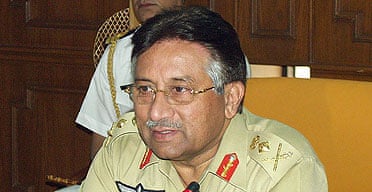The president of Pakistan, General Pervez Musharraf, was today cleared by the country's supreme court to stand for re-election next month.
Four petitions challenged the general's right to contest the election while he remained chief of the army.
The legal action was considered the biggest obstacle to Gen Musharraf extending his eight-year rule. Earlier this month, he promised to step down from the military on November 15 after the planned election.
The president is expected to win up to 60% of the votes in the contest on October 6, which will be decided by an electoral college made up of Pakistan's national and provincial assemblies.
However, opposition parties who object to the army chief's tenure raised the prospect of defiant street protests after the ruling was announced.
An opposition alliance comprising the Islamist Muttahida Majlis-e-Amal and the party of the former prime minister, Nawaz Sharif, yesterday said their representatives would quit the national and four provincial assemblies on October 2 - three days later than planned - to try to compromise the legitimacy of the election.
Today Benazir Bhutto, who has been holding power-sharing talks with Gen Musharraf, said her party could join the boycott if Gen Musharraf did not move toward restoring democracy.
When the decision was announced in the Islamabad court today, the room erupted in shouts of "Go, Musharraf, go".
Lawyers who had argued for him to be banned responded with shouts of "Shame, shame". They also pledged to rip up Gen Musharraf's election nomination papers.
"These petitions are held to be non-maintainable," the presiding Judge Rana Bhagwandas told the court. No reason was given for the ruling. Rashid Qureshi, Gen Musharraf's spokesman, said after the ruling: "Justice triumphs."
The six-three decision in favour of the military leader now gives him the prospect of a further five-year term under a parliamentary vote.
The current parliament was elected in what many observers said was a dubious poll in 2002, and its term of office expires in six weeks.
Outside the court about 100 supporters of an Islamist opposition party threw tomatoes and eggs at the building's front gate as they chanted anti-Musharraf slogans.
Farid Piracha, an MP from Pakistan's biggest religious party, Jamaat-e-Islami, which filed one of the petitions, said he refused to accept the ruling.
"The judges have not fulfilled their constitutional obligation," he said. "Now our fight against dictatorship will be on the streets ... this decision does not reflect the sentiments of the people, and it will not be accepted."
Analysts had feared that, if Gen Musharraf had lost the court battle, he could have resorted to emergency rule or imposed martial law.
Critics have argued that the general has been using his military uniform to force his way back into power through a vote of dubious validity.
Some observers saw the ruling as a key test of whether the judiciary, emboldened by victory against Gen Musharraf when he tried to sack the chief justice, Iftikhar Chaudhry, in March, would act to separate the military and politics.
"We thought the judiciary had become independent. But what we have seen today shows that we have a long way to go," said Hamid Khan, a lawyer for Imran Khan. "It is a wrong decision and it will be proven wrong by the history of Pakistan."
The court victory hands a lifeline to Gen Musharraf, who has faced increasing pressure from a range of opponents.
Opposition parties and much of the country's judiciary have campaigned to remove the president since his attempt to sack the chief justice. He is also struggling to contain growing Islamist militancy.
Earlier this week, the US, a key ally, urged Gen Musharraf to ensure the vote was free and fair, condemning the arrest of hundreds of opposition figures as "disturbing".
The main challenger to Gen Musharraf is likely to be Justice Wajihuddin Ahmed, who has retired.
Ms Bhutto has said hopes of a deal with Gen Musharraf are fading.
She plans to return from exile in time for the elections next month. Among the compromises she is seeking from Gen Musharraf is an amendment to the constitution to allow her to serve a third term as prime minister if elected.
